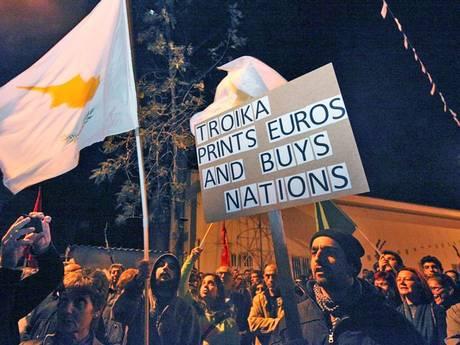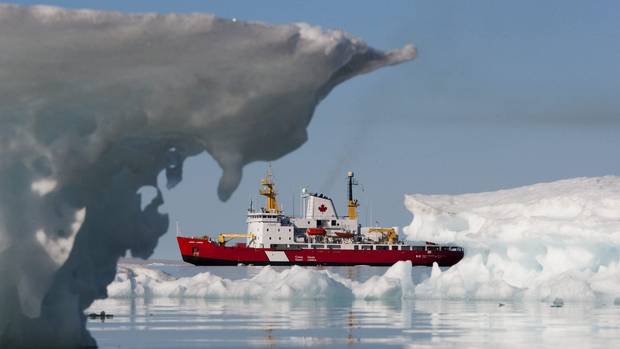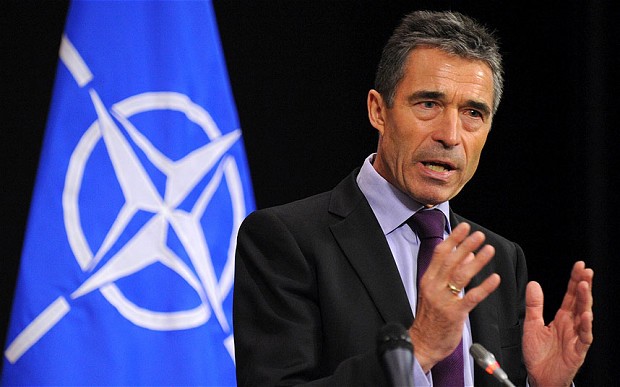[captionpix align=”center” theme=”elegant” width=”600″ imgsrc=”http://www.fpif.org/files/6015/cyprus-bailout-terms-protests.jpg” captiontext=”The harsh Eurozone bailout terms sparked civil unrest and Troika criticism in Cyprus. “]
It’s not every day you need a bulldozer to withdraw from your bank account. Yet this theatrical gesture suited the bizarre drama played out in Cyprus this March, as a bailout deal was struck between EU leaders and the Cypriot government. The agreement, seen by many as an imposed settlement from Brussels and Germany in particular, proposed unprecedented levies on depositors’ savings to re-capitalize troubled banks.
Less is known about the visit paid to Russia by the Cypriot president and finance minister, presumably seeking more favourable terms for a loan. In exchange for access to large off-shore gas deposits, the Kremlin was reportedly willing to re-capitalize the Mediterranean nation’s banks and ease the terms of an outstanding €2.5 billion loan.
Welcome to financial diplomacy – the discreet, technical half of international affairs where finance and treasury officials negotiate deals that shape foreign and domestic policy in big ways.
On a strategic level, a Russian offer of assistance could have driven a wedge between Brussels, the EU ‘troika’ (Germany, Great Britain and France) and their NATO allies, and a lukewarm Cyprus. The island state has never joined NATO and frequently rows with NATO member Turkey – whose forces occupy the north half of the island since 1974. At the same time, Cyprus has played host to British military bases since the 1950s.
Russia is rumoured to be eyeing the Mediterranean isle as an alternative to their Syrian port of Tartus. Last year a Russian ship stopped in Cyprus before it brought arms to Syria – despite an EU arms embargo. The concessions extracted in exchange for a bailout could also have provided access to much-needed offshore gas deposits with the potential to re-shape the European energy landscape. In the end, Russia’s refusal to provide more funds led EU leaders and the Cypriot government to strike a deal, this one less harsh on Cypriots than previous proposals.
The fact remains that a loan to a government in financial difficulty is an increasingly important part of foreign policy. It can secure access to resources, military or diplomatic cooperation and can even make or break regional security. The tools of financial diplomacy can provide new opportunities for both governments and private sector actors to promote stability and security at home and abroad.
China-watchers have been preaching the power of finance for years. They point to China’s investments in the states of the African continent, which are larger than previously thought and growing. While China’s 1964 Eight Principles for Economic Aid and Technical Assistance to Other Countries states that China never attaches conditions to its assistance, long term returns come in other ways. These could range from votes in the UN for loaning states’ causes, to a subtle but noticeably enhanced status for the creditor country within the indebted state.
Aside from leverage – it’s generally unwise to anger one’s banker – successful financial diplomats benefit businesses and individuals in their home country. Lael Brainard, Obama’s Undersecretary of the Treasury for International Affairs, argues financial diplomacy can have repercussions as intimate as the decisions to send children to college or purchase a home, and even impacts retirement options.
[captionpix align=”left” theme=”elegant” width=”300″ imgsrc=”http://s1.ibtimes.com/sites/www.ibtimes.com/files/styles/v2_article_large/public/2013/03/22/eurozone-bailout-chart-updated-graphic.jpg” captiontext=”A Eurozone Bailout Summary. “]
Securing the livelihoods of one country does not mean the citizens of another become insecure. Looking to Greece, the constant threat of default has put the country’s political and economic system on the brink. Youth unemployment has reportedly reached 75% in some places. The far-right party Golden Dawn is enjoying unprecedented support.
The same pattern is found in Italy where inconclusive elections and widespread unemployment continue to threaten the Eurozone’s economic recovery. In 2001 in Argentina, ten Presidents resigned in as many days, unable to tame a massive economic and banking crisis. Eight general strikes, thousands of roadblocks, mass arrests and widespread looting paralyzed the country.
Financial diplomacy offers the opportunity to ensure Canadian and regional security by preventing crises that de-stabilize our allies and their neighbours. One option is loans guaranteed by countries like Canada, Germany and the United States, whose good reputations with banks allow them to borrow more easily. It can provide troubled states with breathing room to address their financial troubles. The benefit for Canada is the security their assistance brings to their allies and trading partners.
In this time of tight budgets, there can also be a role for private sector investors in ensuring stability. Debt crises represent an opportunity for the private sector to work with governments to assist troubled states. By participating in good faith debt restructurings that ease debt burdens, or backing government-guaranteed loans, private investors can contribute to maintaining secure economies. Going even further, businesses with deeper pockets could guarantee relief loans on the basis of their own credit-worthiness.
Not only does this guarantee security in defaulting countries; it has the potential to pay off by turning profits for businesspeople as well. Providing swift emergency funding to governments can re-vitalize faltering economies with stimulus programs and make repayment more likely. By lending to struggling governments, investors willing to take the risk can reap rewards within a handful of years. This is especially the case if they lend on the condition that their money is ‘senior’ – to be repaid before older loans.
Understanding financial diplomacy opens up the possibilities for Canada and its private sector to contribute to ensuring security among its allies. It is an exciting avenue for Canada’s involvement in international security, not least because of the potential for crucial contributions from Canadian business.




